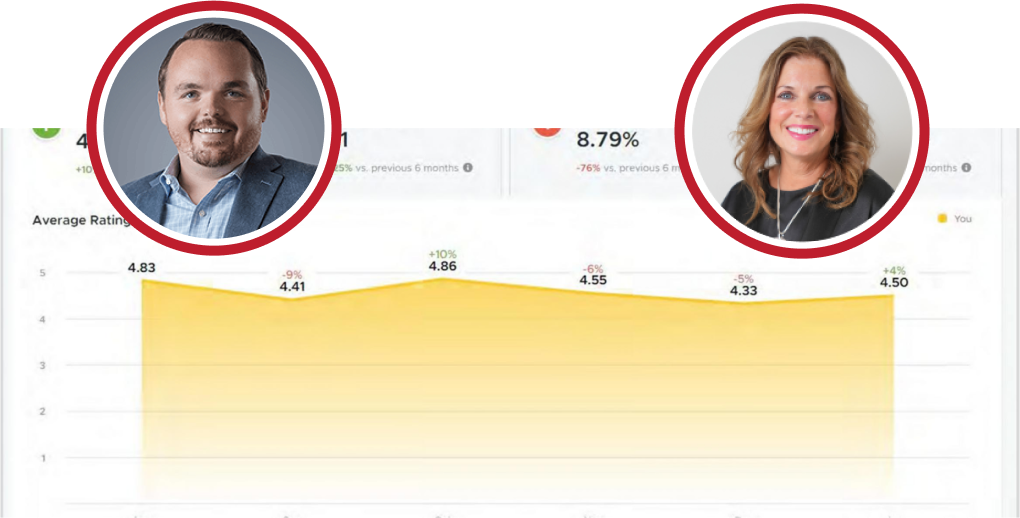Kathy: All right, welcome to Business As “Un”usual 2023. We have a very exciting season in store, and we’re starting with helping you understand the economic scenarios you need to prepare for in 2023. So we’re going to get started in just a few minutes. But just a couple of housekeeping items. If you’re attending via our live stream. Dana Kramer will be managing the chat, so please feel free to add your questions, and she will feed them to me and the panelists today. I’m Kathy Steele, and I’m the CEO of Red Caffeine and your host today. So for those unfamiliar with Red Caffeine, we are a growth consultancy, and it is our mission to build badass brands that people want to work with. For so, why does Market volatility matter to your business as Leader? While we know we can’t control those broad factors, it is our responsibility to make data-driven decisions to maintain the health and profitability of our organizations. so, as a growth consultancy Red Caffeine looks at macroeconomic forecasts and Global Trends to help our clients build growth to a Market strategy that strategically addresses addresses things like Staffing cost management sales and investment and technology. Our panel of Industry experts is here today to help you understand the market conditions, so if your company is planning to grow this year, you’ll know where to place your bets over the next 12 months. so let’s jump in first. I would like to introduce our guest panelists. Starting with Terry. Terry is the managing director at Prairie Capital Advisors and a second-time guest on Business As “Un”usual, thanks for joining us again, Terry.
Terry: Thank you.
Kathy: He focuses on mergers and Acquisitions and capital advisory engagements. In in this role, he assists Middle Market business owners in understanding and assessing their strategic business Alternatives and developing and executing transaction solutions to meet an owner’s objectives. Additionally, he works with Family Management owned and Private Equity owned businesses and helps these clients address their growth and ownership transition issues, including exiting recapitalizations m a company sales and esops. With valuations and deal volumes in decline over the second half of 2022, we’ll talk to Terry about whether this is a good time to consider acquisition as part of your growth strategy. Second, we have Spencer Yurkowitz joining us from cap strat. Spencer is a researcher at analyst and supports the firm’s capabilities by performing in-depth analysis on investment managers, including analyzing manager style strategy and execution. Spencer evaluates the fund’s ability to generate desired investment returns and suggests managers be included in client portfolios. Spencer also assists in developing the firm’s economic and financial Market Outlook, which I found always interesting and informative. Spencer will step us through capstrat’s investment framework to explain how 2022 ended, and then we’ll learn what asset classes make sense to consider in our portfolios right now. Thank you for joining us, Spencer.
Spencer: Thank you, Kathy looking forward to it.
Kathy: And then Jason Turner is the chief investment strategist of Great Lake advisors and our bank Wind Trust. he is a member of the firm’s investment committee, authors market, and economic commentary, regularly presents in the media at professional conferences, and works with client portfolio managers to support institutional and private clients. as the head of the multi-asset strategy is responsible for portfolio strategy, asset allocation, and overseeing the firm’s managers due diligence and selection selection efforts. He’s also a member of the firm’s operating committee and management committee. So a lot of a lot of exciting experiences to share with you today, but we’re going to get started with, you know, Jason. So, Jason, the academy has been on a roller coaster ride for the past few years. Some experts believe that we’re already in a recession question. Others disagree that you know, but it’s only about timing, and then you know people are talking about whether to expect a soft or hard Landing. All right, what do we do? It feels like it’s changing every day, so can you take us through, you know, the current economic overview?
Jason: Sure, and we can delve indoors and start with that first slide on inflation in the big economic story. Putting that Network context, though, it is not even on the next slide. You can see what the average was for the last cycle from from the 0809 economic downturn Point risk session in 2020, and where we started was an inflation level of just one point that targets two percent for inflation, and only one point six percent than on average really the price movement over the last decade the prior couple of decades. And we can see that things apart and inflation on the next slide, over the one certainly seen some areas of of runaway inflation until up over 13 percent of food 11 percent the only area we see in trucks and and that was an area that we saw Spike up into amid shortages in the supply prices they’re received. So it was inflation has come down, we’re starting to see some of those early movers. Come down, the stronger movers from early in 2022 start to paint a better picture, though on the next inflation since 2009. inflation since 2009, and if you legalized column, that really shows us that it’s two percent Target and a couple of key areas and Energy Services in effect. That’s what we’ve experienced nearly ten years worth of ketchup inflation, and that’s been very, very uncomfortable economically on destabilized, so a viewpoint on the employment one, we can see that the employment markets have efficiently the unemployment rate sitting at three and a half percent before the pandemic it has been on that low for much. And we continue to look.
Kathy: Jason I, I hate to interrupt you, but we are having some trouble with your volume, so I’d love to see if we can sort of get it back on track. I know it’s what we hear just about every other word. Can you maybe switch gears on on your sound?
Jason: Sure, how does that?
Kathy: Well, when yeah, why don’t you try and kind of get back on on track? We were just I, I think everybody we’re starting to get messages from, you know, the attendees, yeah, there we go.
Jason: Okay, is this any better?
Kathy: Oh, much better. All right, we’re back on track, technology.
Jason: Excellent! Do you want me to backtrack, or just?
Kathy: Yeah, why don’t you backtrack a bit? So should we start back at yeah, that would be great
Jason: Sure, we can back up and look at where we were from 192 and a half 2.6 percent sit now. Oh, it’s seven points. One percent is significantly lower than it was earlier in 2022. Obviously, then average applied forward though, and putting this into context cycle from the end of the 0809 to the 2020 pandemic, we saw an average inflation rate on that next percent and 1.7 of the FED that’s two percent Target and that two percent to move an economy forward a little bit of such inflation is bad deflation price is moving forward little by little you know. Moving yet another slide forward, the Consumer Price inflation in over one year, one more step there on the slide.
Jason: And we can see.
Kathy: Maybe you were still struggling with the volume, so I don’t know if if you’ve got another sound access, I can’t tell if you’re on AirPods still, but.
Jason: Let’s see if that’s any better sounded a.
Kathy: Little bit jumpy still, but let’s try it.
Jason: From one year, I had perspective. It went down in some areas. Used cars, for example, are an area that we saw as a canary in the causing inflation. that is now seeing prices received by three percent over the trailing still see elevated levels in energy over 13 percent food up over ten levels. We thought earlier this year we were either seeing a play Towing or a like shelter as one of the loan holdouts shelters continues to March higher through a calculation called owner’s equivalent rent. Home prices have increased for years. That phenomenon is unlikely to work its way through inflation in the March to April time frame to see that turnover as well. putting it again into a different context, see that Consumer Price inflation since 2009 on an annual line in many areas is just above that FED target just above two percent on that, and that tells us a little bit of Insight, or intelligence, the Federal research flow action 2021 impressing at that that planetary policy Advanced until March pretend quite reached those annualized levels we’ve been catching up that we missed. But now we are rapidly On Target in terms of the reset on where we stand in the economy on employment markets markets on the next slide, have seen an unemployment rate fight economic difficulty in 2022 and a volatile stock market near much of the half of the cheer. we could have to buy Edge forward again. let’s go one more as well to try to explain somewhat employment, I think, yep, the difficulty was having and hiring or have been having. labor force participation is one area we look at closely. We were at a highest of over 63 for the pandemic. We dropped to 60 in the depths of the pandemic, and I’ve only recovered a number that might seem like a number that is pretty close to 63 to 62, but in reality, that’s one percent election accounts for some some nearly 4 million people. I would argue that this is as good as it’s going to get from a location we pass Peak baby boomer retirement during the depths of the pandemic. We missed that headlight in all those headlines around covid. but also, we’ve seen, as we have seen in other periods of employment markets, a number of people decided to retire early, so I look at that bottom participation from ages 25 to 54 to get an insight into where we stand. A week and a half percent of that age demographic participating in the labor force are 80 80, above that average. and that’s part of the reason why I feel we’re not going to get the labor force to Aid in addressing some of those hiring concerns. You can see where those hiring concerns have led us. we have seen a large and total job open, although that’s pulled back from the nearly 12 million people with that before the level of 10.4 million job openings that we sit at today certainly level. but if we forecast the rate of growth for the five years they pretend that can happen, we’d be sitting at 10.9 million job openings. it’s an outcome of the need for the American economy like and then continue to grow. The economy has been a persistent theme since really 2014. we’ll take one or a step of the sum of this back together, so let’s tie wages and inflation together. if we take one that’s provided now. should be on that slice and inflation. we see the unemployment rate the Consumer Price Index is 7.1 percent and now we’ve seen average employees basic up 4.5 office Peak nearly an important thing not the same relationship between Africa and the unemployment rate that we saw pre-pandemic when you see the unemployment rate go down earnings typically go up I mean let us employees pay more for the employee right and the odds up hourly earnings go down down in time times of higher availability of employees we’ve seen the average hourly earnings here in 2020 to track more closely to inflationally as inflation has ruled throw his we’re not seeing a lot of wind currently picture to the inflation expectations line then inflation expectations important part of of pushing inflation higher too and part of the case why we don’t think that inflation heads to continue to run that inflation expectation right now for consumers in the year ahead is five percent one year from now and we said again a little over seven percent out long term Outlook either from the bond market or consumers telling us reading back into the two percent range for that difference. in expectations on a go-forward basis tells us that the consumer patient is going to fall all in the future inflation expectations can be a source of sticky wage inflation. With expectations trending downward, we do not meet expectations to push inflation higher as they did earlier than this year. Connections to make for you and that that’s the individual consumer on the by them. You can see that at a point in 2022 or from where you’re at, personal spending outpaces. This is telling us that the average American can consumer, and it’s hard consumer spending internship it’s very hard to turn in a short period of time. So as income, it takes a while for spending to react, and we have seen over the back course of putting outpace and incomes and what does that lead to, and we can see that on on one more on credit and savings, we’ve seen the personal circuits are putting away decline to just 2.7 or the pandemic we average we even saw this number peak in the mid 20 range as we got the first stimulus in terms of fiscal statement with savings depleted and Americans not saving even at the rate we’ve seen a corresponding increase in the use of consumer credit so well, and it’s been higher throughout 2022. it’s increasingly being fueled by credit. and that’s an important concept because that’s an inflection point we usually see in a recession. usually, Americans take a little bit longer to react in terms of change, and then their income or savings change in the near pandemic shift. We typically see those windows occur, and you can even see it here in the chart. You can see the increase in consumer credit over and above the state right back then as well as what has really driven the economy from inflation employment tumor Chris Viewpoint in that incredible reaction on the next slide of the Federal Reserve this line that quite honestly looks like the mountain climber from price is right it’s their step up we saw four consecutive 75 basis point hikes from last year. I have to go back to the early 1990s to even find the unprecedented nature of the rapid rise in the federal funds rate. their focus on fighting inflation has been the overriding policy story of 2020 FEDs comments from December that they remain committed to an aggressive Monastery until inflation is down completely. why would we expect the FED to continue to the early part of 2023 before hopefully taking a pause after either February or evaluating the economic impact of their significant increase in monetary policy?the whole level of that of where we stand from an economic perspective in terms of a current Outlook touch on the outlook for 24. Forward.
Kathy: So Jason, we still had a lot of connectivity issues. Is there a way to kind of boil it down to a couple of key points for Business Leaders?
Jason: Absolutely, from a a key point of inflation has been high and has been a problem problem, but it’s a problem that’s going to resolve probably fast faster. Inflation resolves itself FED policy should level update rates come down in a meaningful way for the balance of the year. The impairment will continue to be challenged from the availability of a Labor perspective. Although wage take away perspective inflation is a resolving problem, the employment markets still pressure receding to some extent, and FED policy is lining up along with the in advance of cyclical recessions.
Kathy: All right, well, thanks I. I know it was a lot of I. I hope I appreciate everybody bearing with us. I know there was some challenge in the sound, but we are going to switch gears and have Spencer start to take us through how these factors are going to impact the, you know, people’s personal investment strategies.
Spencer: Definitely definitely. and Jason hit on a lot of good points related to markets and the economy and we’re going to expand on that and talk about the overall macro setup for 2023. so our macro framework is extremely important. It helps give us a perspective on how to position portfolios and Investments going forward. and the first piece of that is looking at the underlying conditions surrounding us, so there are four inputs to our framework that matter. those things are liquidity inflation, economic growth, and recession. so we take each of these four inputs and we look at a combination of two things. one is the levels which mean we’re looking at each of these inputs and comparing it to their long-term trends. in order to determine if this variable is relatively High relative to history or relatively low relative to history. so once we establish whether that variable is high or low the next step is to see where each of these things is headed. is it going to be rising over the next 12 months or is it going to be falling over that time period, so that’s extremely valuable for managing portfolios in terms of we can transition that and and look at how asset classes perform in each of those macro environments? Also provides great insights for businesses in terms of the type of economic conditions surrounding that environment. you’ll see the last component in step three here is prices prices obviously change every day and every second for something like stocks but the general idea here is to look at prices relative to where they’ve been, and that way, you can determine attractive entry points for any type of position you’re looking to get into also we’ll start up at the top with step one, and that’s over on the next slide with liquidity. so when we talk about liquidity, what we really mean is the growth rate of the money suppl.y the money supply is really the plumbing of the financial system that matters for both Financial conditions for investing and also for financial conditions for businesses. so here what we’re looking at is a chart of money supply growth in the United States, so the year-over-year change and you can see coming out of covid-19 that recession there at the sort of on the right-hand side of the page here we had a record money supply growth. more money was created in a shorter time period in history than ever before and over a third of all U.S dollars in existence today were created during that time. so money supplied during that time was definitely high, and there was a lot of money, and money was growing in the economy during that time, so the money supply was high and rising. that was because of all the things the Federal Reserve was doing. They were cutting interest rates to zero, unprecedented fiscal stimuli, and even stimuli like the cares Act. when all those things happened, the stock market quickly recovered because there was just so much money in the economy that it had to go somewhere, and the economy was closed. so transitioning from that point to where we are today, we ended 2022 with the exact opposite of that the lowest money supply growth in history basically at zero percent. and that can explain a little bit of what happened in 2022 pretty tough Market environment. you’ll also see our forecast hacked on to the end here in that light blue line, and we believe that we’re going to be transitioning now to a low liquidity environment, which is historically a very difficult environment for markets in the economy. there just isn’t enough money left to continue to bid up both the economy and stock prices. so you might be looking at this chart and thinking you know what’s caused this extremely dramatic shift we had the highest money supply growth ever and now the lowest. Well, it’s because of what the Federal Reserve is doing to fight inflation. And that’s the next key input in our framework over on the next slide. What you’ll see here is a similar style chart. We have the one-year change in prices in the blue line, the one-year change and prices except for food and energy in the green line overlaid on that is the long-term trend line right well we’ve been in for the past two years or so had been a high and Rising inflationary environment. and high and Rising inflation is a really difficult environment for bonds it could be a challenging environment for stocks as well. reason being that when inflation is coming in hotter than expected that pushes up bond yields pushes up interest rates, and that’s a bad environment for bonds. in the short term as the inverse relationship between yields and prices and then you also have stocks looking relatively less attractive going forward once bonds have appreciated during that time. so you’ll see our dash line for our forecast tacked on here as well, forecasting 4.3 percent for core inflation in about 4.2 percent for the headline to end the year. so what does that mean there’s some good news and bad news here. we received signs, you know, early or sorry, at the end of 2022 that we were transitioning to this regime of low-in, sorry, high-end falling inflation. and the good news is that that’s historically been a good environment for fixed income. yields tend to come down in that environment. The Federal Reserve may be able to pause some of its rate hikes once inflation is coming down at that point. so it tends to be a a pretty good environment for bonds but the bad news is that inflation is still high. So our, you know, we’re forecasting that the FED is going to have to hike rates a couple more times in 2023 and probably keep them there for the remainder of the year. The reason is that they’re trying to keep that money supply low in order to to take down inflation. So the FED is going to continue hiking rates in order to combat inflation, and that has implications for the next factor in our framework, which is economic growth. If you could go over to the next page, here we’ve got a real GDP here. so real GDP measures the overall growth of the economy after you take out a good, sorry, price increase from inflation, so what we had here consensus estimates for real GDP in 2022, and that’s the dark blue line and then in the light blue line GDP estimates for 2023. and you’ll see that estimates over this time period over the last 12 months have really just been trending downwards the whole time. so now we’re at the point where GDP for 2022 once we get the final fourth quarter number is expected to be near zero about point four percent. and growth for next year is now expected or for this year for 2023 is expected to be near zero. and for context, the long-term average here is about two and a half or three percent or so. so putting these things two things together entering what we expect to be a low and falling growth environment. to add some more context here, we added a red and green bars over on the overlaying the chart as well, which is the economic surprise index, so green bars indicating economic data coming in better than expected in red bars indicating the economy is doing worse than expected. you’ll see that growth expectations really fell during those summer months last year. a lot of that driven by the real estate sector. Home prices are really significantly impacted by changes in interest rates. with growth estimates really falling over the entirety over of the course of last year we’ve been very closely monitoring our recession indicator over on the next slide and the last piece of our macro frame so our recession indicator takes into account key market economic data points as well as uses other recession forecasts to create essentially a composite recession forecast. so we can blend all of these things together to create a forecast for a probability of recession over five unique time periods here. the blue line that you’ll see on the chart is the composite probability also a combination of all those five times. where we ended 2022 was that there is a relatively low probability of recession that the economy was in a recession at that point in time. I’m sure a few of you out there have seen articles about companies slowing down their hiring or cutting back on their workforce. But overall, the labor market is in a relatively healthy position right now in terms of unemployment. ending the year near all term ending the year near its all-time lows, and in the U.S., as long as people still have their jobs, they’re going to go out and spend their money in the economy. However, despite the strength in the labor market, there is an elevated probability of recession over the next three to six months in the near term. right now we have about a 60 probability of a recession starting in the next six months it’s no surprise that recessions are a very key input for the macro environment given recessions are pretty difficult for most asset classes it can be a tough environment for businesses as well as they see a few less orders come in that they might have than they might have been seeing last year foreign if you could go to the next slide we brought one more page just to dig into some of the components of the recession indicator and expand on this of where those probabilities are coming from. so you’ll see the forecast Horizon and data point listed on the far left-hand side of the chart of the table. and on the far right-hand side of the chart, the most recent data point or most recent recent measure that we have available with the red, orange, and green indicators indicating how much it’s contributing to that recession probability, so really, there’s only a few data points still left in the green that are saying we’re going that we aren’t in a recession and that is heavy vehicle sales in the labor market. vehicle sales are really just recovering from Market shocks in 2021 with some of the supply chain issues there and Supply chains coming back online, and then you’ll also see towards the bottom of the page those two green numbers for the Som and indicators the Som recession indicator is based on unemployment rates obviously driven by the labor market and that’s saying the low probability of recession right now and the bigger indicator also based on the labor market and utilizing some additional data like payrolls and Manufacturing sales those two data points signaling that we’re not in a recession right now so putting in all the pieces together here started with liquidity the money supply growth hit the lowest level at the end of the year in 2022. and no meaningful growth in the money supply is expected next year. money supply growth was so low because the FED has been trying to fight inflation so they’ve been raising interest rates and reducing the size of their balance sheet. inflation is Public Enemy Number One so the FED is really slamming on its brakes right now to try to stop that. even though inflation is high, it’s expected to come down to levels that the FED will be able to stop hiking interest rates at some point in 2023 definitely affected areas of the economy like real estate last year, which drove growth lower in 2022. it’s likely to lead to lower growth in 2023 as well with a recession very probable in the next three to six months. in terms of asset class performance, stocks are expected to stay in a difficult macro environment for pretty much the entirety of the year. You know recession probability and low liquidity are the key drivers there; however, there’s definitely a brighter picture ahead for fixed income or for bonds. I expected to be in one of their strongest macro environments than what we’ve seen in like the last ten years, and that’s due to high and falling inflation, which is good for bonds expecting interest rates to Peak out and maybe even start coming down a little bit in low and falling growth also tends to be good for a fixed income as people sort of say Seek safety in some of those safer less risky assets, so I’ll leave you with that even though you know the year ahead may be challenging in terms of the macro environment definitely still opportunities in terms of how we position portfolios in in terms of how businesses stay on top of some of these trends.
Kathy: So it sounds a bit like it’s going to be the year of the band from what you’re saying, and then, you know, it’s a little bit sector driven. It looks like there there’s, you know, some hopeful things going on in Manufacturing in some select sectors where other or other sectors are going to have more negative kind of performance. Is there anything you know else I I feel like it’s a little confusing with the employment numbers being so low with, you know, with unemployment being so low it, it sends a signal to to leaders that we still should be investing in our talent strategies? Although, on the flip side, we’re seeing a lot of layoffs and those types of things, so any any follow-up commentary on that, Spencer?
Spencer: Yeah, I could definitely add some comments there and great questions. So first, starting with, you know, it going to be the year of the bond market, so in terms of, you know, performance expectations for the bond market next year, one thing that is somewhat underappreciated with bonds is that you know, as they go through tough time periods like they did last year arguably 2022 was one of the worst years for the fixed income you know in recent history, but that spells a better environment going forward for bonds no bonds are fixed payments. So even when you know the price of bonds fall and you get Negative returns in in your portfolio, that also means the yield of that Bond just went up, so you can you know in this environment where you know you can get a four percent yield on a high-quality Government Bond that’s definitely an attractive environment for the bond market going forward probably you know one of the strongest environments than over the last ten years or so in terms of how you know we might expect different sectors to you know to perform over this next year you know it’s definitely the type of thing where it depends on the type of industry and space you’re in but in terms of you know what we can suggest is to just this is one scenario the most likely scenario that we see going forward however it’s important to just have your playbook ready for this year in terms of you know markets move fast the economy moves fast, and things can change. So just to be ready for, you know, any type of outcome depending on, you know where, where each of these four inputs trend over the next 12 months.
Kathy: Thank you, thanks for that. All right, Terry, why don’t you bring it home, as we kind of talked about in the intro, you know the the deal volume activities have been a bit declining, but you know there’s still some really positive positive information in the merger and acquisition space so take us through some of that data.
Terry: Sure, yeah. So this first chart here just goes through the m volume by a quarter since before the the pandemic in 2017, and really specifically, if you look at the year 2021, that turned out to be a record year, like the all-time record year in Global M A as well as us M A and then Middle Market M A here in the United States States as well and so 2021 after the pandemic was really something that was extraordinary and I think everybody in the deal business including business owners kind of thought okay this is really easy you know I can sell anytime I want to get a high value. And so I think we’re going and trending toward more of a traditional m market. And you can see this year 2022 first quarter was about equal to 2021’s last first quarter last year’s first quarter and so that was a record year and so we started off the year maybe with some expectations that we were going to continue that but if you think about it we had an invasion of Ukraine by Russia early in the year we had a resulting energy Market disruption we had continuing supply chain issues and then we had big declines in equity the equity markets and you know all of the markets were pretty volatile inflation became a bigger factor and I think you know the two economists went through some of the reasoning for that but I think there was both Federal FEDpolicy as well as Congress kind of tinkering a little bit too much putting too much fuel on an already Raging Fire and then as a result we got high interest rates and so basically a lot of those factors happened but the results are yet to be seen in the m a market I would say business sentiment right now and I I always look at something called the nfib. I think it’s a national Federation of Independent businesses. They do monthly tracking, and they’ve had for the last 12 months negative business sentiment, and the most recent one came out in December, and it was a continuation of that, so businesses aren’t feeling really good, and then the same thing happened with the consumer sentiment which is the Michigan University of Michigan survey that is pretty low right now although in in I think the most recent one it popped up a little bit but it’s still nowhere near the highs that once were there and so basically deal volume if you look at the aggregation of this is down about 20 percent over last year, and the number of deals also is done about the same, so you know you might say well gosh you know I just heard two economists talk negatively now Terry’s talking negatively what’s going on here and I would say there’s still many M A deals done and if you look at the last bar that’s shown here Q3 that represents about 733 deals. And so somebody is selling things, and somebody is buying things, and maybe it’s not as many as were, you know, a couple of quarters ago, but it’s still happening and so it’s I think it’s a time to be optimistic if you’ve got the right characteristics of a deal or a business you know to engage in m a so I’m pretty optimistic cycle to the next slide. You know, a couple of questions here, or a couple of comments here is private Equity Funds basically now are the largest owner category of businesses in the United States other than individual business owners, okay, and just in perspective, there are about almost three times as many private equity owned businesses now as there are public companies.
Kathy: Wow.
Terry: To think about that for a moment you know private equity is a big factor here and so it’s it’s one of the things that we monitor closely the takeaway though on this chart though is like the other chart which is overall m a volume of the volume of private Equity sales exits has also declined and if you think about it these are the professional business buyers and sellers and they sell and buy when it makes sense to do so and if they’re not selling you know or diminishing their sales you know maybe that’s a some a signal some business owners should take but the only thing I would say is keep in mind there still are a lot of number companies being sold even by private Equity Funds and so once again the private Equity Community even though they’re pulling back a little bit they’re still selling and then also if I had another slide up I I don’t have it but you know they’re also doing a lot of buying as well which brings me back to what PES represent and depending on how you measure what private Equity Funds have to divest or invest rather to deploy it’s somewhere between one and three trillion dollars of capital that’s that’s in funds waiting to go out and most Equity Funds are time Limited meaning they have a seven to ten year time period in which to to invest that. And so, again, they are deal machines. They’re hungry, they got mechanisms set up, they’re constantly looking for New Deals, and so you know, that’s another characteristic that I look at, you know, that’s positive is there’s always going to be dealt because there are always private Equity Funds and then there are also strategic acquirers as well. And I’ll comment on that in a slide or two more advances to the next slide, so the rules of supply and demand affect the m market as well, and so when the supply of deals is down, the demand is still pretty consistent, you know with private Equity Funds having to deploy, and so valuations are The Equalizer you know to make the laws of supply and demand come into balance and so you can see that these bars which represent small deals in the yellow bars the middle bar is gree or the middle size deals and then large deals are the dark bar, but you can see that valuations even with the events of this year have been sustained pretty well. And in fact, in the third quarter of this year of 2022, rather they’ve actually climbed, and I think there’s a little bit of a measure of supply and demand in that, and then the dark bar is large deals, and that’s where interest rates have started to have an effect. Basically because of the FED policy interest rates have risen as a result that service costs by companies or four companies have increased and so therefore the riskiness of those companies has increased and that’s led to a commensurate pullback if you will by The Lending Community commercial Banks Business Development Corps you know other types of debt funds and so because they work mostly with large deals you can see that there’s been a negative impact already in the third quarter to valuations for large deals because of financing smaller deals do not have that same thing because they’re usually going to One bank and it’s easier to round out a financing package if you’re talking to maybe 10 Banks and all you need is one to really like the deal whereas if you do a big deal you need to Syndicate the deal if you’re doing 200 million and so therefore you need maybe five or six Banks to agree and it’s harder to do that and so this is an early warning signal maybe that the financing issues are might migrate to the lower end of the deal a deal Market that is but the important thing here is there are still deals being done at some pretty nice valuations and just to comment on our data here is we are right now in the middle of January and the data that the data sources that we use it takes about a quarter for them to collect it and so the reason we don’t have fourth quarter data available is that’s being collected now now I do have preliminary data and basically a lot of the trends I’m speaking of are starting to show like a further decline in m a volumes and we’re seeing a little bit of a decline in evaluation metrics by size on this slide so anyhow valuations takeaway on this sliders are still pretty good and I think there are still pretty good opportunities for buyers or for sellers to sell their companies and then for buyers to buy companies as well cycle to the next slide.
Kathy: So, Terry, really quick I, you know I guess I would be I’ve been loved to think that this would be a good time to buy that that there would be you know lowered valuations coming just but it sounds like just because of the supply and demand situation that you know they are that we’re going to see valuations still hold pretty strong or that which are predictive well I would say though the way the m a market has evolved over the last say 20 or 30 years is there are a lot more people like me m a advisors out there and so there’s a careful process you know we put a competition in place you know to set one buyer off another so I mean there’s a they’re pretty strong you know ability to to keep valuations high if it makes sense now a couple of things too and it this is a an important point is there are two parts to evaluation number one is the multiple and that’s what we just looked at and we’re looking at it here and I’ll comment on strategist on this but the other one is earnings and so in an inflationary environment some businesses are having some earnings difficulties and we’re starting to see that a little bit in the public markets now it’s earnings season and there have been some disappointments somewhere down some downward guidance Etc and so even if the multiples are are kept at the same level but the earnings suffered the multiple times the lower earning means a lower dollar valuation and so you know we’re going to see a lot of dynamics that are going to intermix I think going forward and the other thing too Kathy is we still there’s always a lag as there always is sellers still think you know they still think you know it’s 19 or it’s 2021. and so they want those values right buyer or seller expectations are still high buyer expectations are low. And then you know the mix is kind of like willing buyer willing seller and how you end up so so this slide really addresses strategics versus private equity and so Financial buyers the Private Equity Funds of the light green bar strategics are the green bar and we noted in our our data over the last say a year and a half or so that the Strategic Community still very active in the m a market but less likely over the last 18 months to pay up for a deal and so there was more of an equalization and you can see that 2021 and then the first two-quarters of this of 2022 you know where there was about equal or close enough to be called equal. the reason for that is our theory was that a lot of strategics all they wanted to buy things they weren’t going to pay up for them because they were already having a lot of the supply chain inflation you know all sorts of issues within their own business and why would I go and pay up for something and double down on all my risks and so they became a little more conservative in the offers but you know the third quarter of 2022 that just all the shackles came off the strategics and they started bidding up again and I think there’s a little measure on the private Equity side of maybe less aggressiveness on private Equity Funds again because of financing issues as well but the valuations even on that bar are still relatively High now one thing that’s important to realize is that strategic acquirers make up about 70 percent of all deals. And so even though private Equity Funds are in a growing and emerging, you know big category of owners to treat strategic acquirers still make up a big part of that, and that’s a business that’s already in the business that they’re acquiring if you follow that so and so I guess the message on this slide is basically if you’re selling your company you got to think like a buyer and try to find those strategies because that’s where you’re going to get some value appreciation and then like I said the emerging issues are probably going to affect this slide the most and so the next quarter when we release the data you’ll probably see a kind of a decline in valuation multiples here.
Kathy: So, Terry, what’s what’s what are some of the upsides of a strategic purchase if you were looking to make an acquisition?
Terry: Well, so strategic acquirers basically have synergies, you know, that they can apply to any deal situation, and so they get Revenue synergies which are maybe they get a new customer base, maybe they get scale which can play with rev or revenues as well. You know, they get more plants or more capacity so they can, you know, produce more and get some more Revenue. They have a lot of synergies on the revenue lines and then the same with costs. You know they can remove redundant costs, you know, maybe you know.
Kathy: So even that they might be paying a higher valuation there, there could be some definite Financial upsides to making a strategic?
Terry: Exactly, and then you know, like the same thing like I’ve I’ve I know a lot of people on the buy strategic buy-side, and they go through five-year plans like most, you know, well-managed businesses do, and you know, there’s a parameter out there they they you know if you look at almost every company public company they’ve got growth internally and then M.A growth and so sometimes when you put a plan out, and you say hey we got to use M.A. to grow you know that means they’re going to pay a lot more maybe just to get you to know that plan accomplished so you don’t get called on the carpet like how come you never bought anything over the last five years to make the deals happen. So okay, the next slide just talks a little bit about financing. We segued into this a little bit. You can see here this is just a little bit of a busy chart, but if you look at the base of it, the Orange Line, you know it is the debt component, the senior debt component. You can see that that’s declined you know through you today 22 and then the equity component is increased and again that’s because of the more conservative nature of the bank lending environment. on the next slide just goes through volume and I I’m looking at there’s some questions here I just want to focus on the slides for a moment and handle the questions but you can see that volume of loans is declined this year and I think a lot of it is just because of the more conservative nature of the the bank lending community cycle to the next slide a couple things I want to point out we follow obviously the financing rates for us you know it’s very important to look at you know prime for some of the lower end Middle Market companies and then sulfur which is the new Libor in the base pricing rate for loans the key takeaway here in prime is a good example you can see the FED policy of you know they’ve raised interest rates you know their guidance on FED funds rate from four and a quarter to five and a quarter and no surprise prime rate is up you know four and a quarter I believe here and then the one thing that we look at or I look at is the two tenure treasury differential the yield curve balance if you want to call it that or or upward or downward sloping go to the next slide. You can see here that the green line being last year’s end, we had a nice upward-sloping yield curve and clue me implying a normal inflationary environment, and then you know, look the mess on the top of the slide, which is this here you know with Bates basically is I think Spencer mentioned you know he can get a great value in a two-year treasury now because it’s around four percent or above but yet you know like a 10-year treasury is lower than that, and that’s a very crude methodology of pointing to a recession usually when you get an inverted yield curve somewhere down the road a recession could occur, and The Economist can address whether that makes sense or not. But I look at that as just a marker, and then the final slide on this is just, you know, again, a look at leverage, and this is just fragmentation of debt, and the green bar is senior debt, and you can usually go out and borrow about three times the senior debt, and then there’s something called mezzanine debt which is quasi-det quasi-equity and in the current deal environment you know that’s still a little component, but the big big message here is that you can see there’s kind of a declining debt usage by deals in the deal business so if I can just summarize real quickly here and I know we’re getting really close to the end. You know basically the number of deals is declining but deals are still getting completed so take away is you know even though there’s declines that means supplies down and if you’ve got something you want to sell there’s probably a way to go about selling it the other thing too is at least through 2022 valuations have been relatively high and have been sustained and so it’s it’s it’s an environment where you can consider a sale and still get the value that you want but not every company is going to see that and it’s going to be very important to to think like a buyer and get your company that you’re selling to look you know like what the buyers are interested in and so in a market like this preparation and again I’m addressing from the sell side Kathy and I’ll talk on the buy side in a sec but you got to think like a buyer and you know really critically analyze your company you know look at its value drivers know what makes your drive your value and how you can emphasize that to a buyer and then critically analyze your management depth any issues you’ve got in your company because in this kind of environment the buyers it used to be a seller’s market in 2021 and now it’s a little bit of a buyer’s market and so you got to make sure that you dress yourself up to be good for the buyers.
Kathy: Thanks so much. I I really appreciate I know we are getting to time, but I did want to Circle back to one question that came in. I think it’s a great question to end on we talked about recession probability. I’m wondering if you could all just take a minute to answer your take on severity and Longevity, so Jason, let’s see how your volumes come coming in. Would you mind taking that question?
Jason: Sure, and I would say 90 of the next six months, and I would just anticipate that to be shortened shallow in eight months and shallow less than a one-a-half or two percent decline in CH.
Kathy: All right, so you’re it’ll be the next six months happening in the next six months and short and shallow, so I love that. Spencer, what do you what what is your sense?
Spencer: Yeah, it’s really hard to say before we really get in into the into the data. You know what’s what’s really challenging about a recession is it depends a lot on how policymakers respond to it, and when markets are selling off, unemployment’s going up, is somebody going to to step in and do something is the FED going to Pivot is is is the government going to enact more stimulus so it’s really hard to say how long or deep a recession might might be but our our sense right now is that the FED is so committed to fighting inflation that they’re they’re not going to Pivot their policy at any point this year.
Kathy: All right, and Terry.
Terry: Yeah, well, so I’m not smart enough to be an economist, but I listen to a lot of economists on the conference board, which I think is a Consortium of economists. They’re predicting that the first three quarters of 2023 will be negative GDP growth but very modest, and then the fourth quarter is going to spring back and be very strong such that next year I think they’re calling for 0.2 percent GDP growth and then that’s following this year at two percent which is what they think the final estimate will be and I’ll go with that but Jamie Diamond and others like him you know also agree there’s some modest or light recession coming.
Kathy: Alright well I’d love to take you all up on returning next year to see how your predictions net out so with that I want to just go ahead and thank you all for being a part of today’s session I know there were some challenges so I really appreciate the audience staying with us so thank you to each of our guests Terry, Jason and Spencer and their information is up on these slides so please feel free to reach out if you’ve got some direct questions they if you put Business As “Un”usual in the subject line or in your Outreach in LinkedIn I they will know that your your question is coming from our session today so I also would like to thank our sponsors on Insperity HR source and M3 and tell you a little bit about our February session so in February we are going to be featuring one of our of our sponsors Skip Miller is from M3 and we’re going to be talking about outbounding a better way to grow sales so most organizations want to grow through organic sales but quality inbound leads are drying up and most aren’t seeing the results they want in their marketing and sales effort so something really has to change. Selling in 2023 is very different from what it was just a few years ago so, and people are not answering the phones or even working in the office anymore, so face-to-face conversations networking events, and lunches even happen less than before, so one of the ways that we help companies level up their sales and marketing strategy is around proven best practices, and we don’t just make it up as we go so we’re constantly refining our approach based on what we learn from Market experts like M3 learning and Skip will share insights from his research and surveys that they’ve conducted with top sales Executives over the fast past 15 quarters. They’re going to share a few trends in changes in what is expected in sales in 2023, and then some of the challenges usages should expect if you’re trying to do more with less in your sales strategy. So he’s going to be sharing how to focus your time, how to shorten the sales cycle, and then most importantly, he’s going to be sharing from this book how to instantly become better at outbound sales. And we’ll be giving out a few books to those of you that that attend, so it’s going to be a really exciting session. I think you know sales is going to be a really important factor in all our organizations this year, so you know anything we can do to approve those outcomes will be worth the time. So again, I want to thank our audience and our panelists for joining us today. You know, if this is your first Business As “Un”usual give yourself some kudos for investing and being a more informed leader knowledge is a powerful tool in your business strategy, and we know that growth is a choice, so if you’re still unclear about where to start and what to invest in let’s connect, and we look forward to seeing you next month thanks again Terry Spencer and Jason for your time today.
Jason: Thank you.
Spencer: Thank you, everyone!
Terry: Thank you.









































































